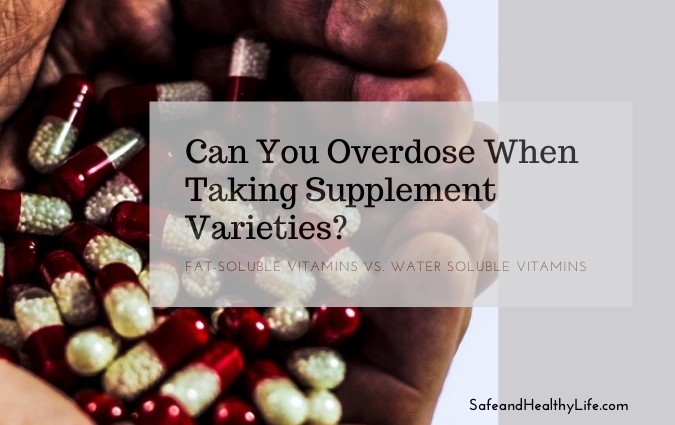
Most of the population consume supplements to make up for what they’re not receiving nutritionally in their diets.
Unfortunately, in many situations, more vitamins are taken into a person’s system than what’s recommended by medical practitioners.
There is a lot of misinformation leading consumers to believe that higher doses give more significant benefits.
In fact, too much of certain nutrients can not only do the opposite but can border on dangerous.
Can You Overdose When Taking Supplements?
The claim is that indulging in extremely high doses of specific vitamins in rare instances can lead to possible fatal complications. Learn the effects of consuming too many at https://www.webmd.com/diet/guide/effects-of- taking-too-many-vitamins.
It is incredibly rare that you will die from an overdose of vitamins or minerals, but reports have been cited for vitamin toxicity-related deaths. These can include:
- Hypervitaminosis A: This condition is caused when a hefty dose of vitamin A equaling over 200 mg or otherwise, chronic use equals more than ten times the suggested daily use. The results of this abuse include serious complications like coma, an increase in spinal fluid pressure, and the potential for organ damage resulting in a fatality.
- Vitamin D: Megadoses of this substance for which a daily intake of 50,000 IU would deem excessive, over the long term, will result in hypercalcemia or high levels of calcium in the blood, which can lead to death.
Other vitamins taken in extraordinarily excessive doses offer potentially fatal side effects like liver damage, including extended-release niacin at a dose of over 5g.
Remember that an overdose to this capacity is only possible in extremely rare cases when a person chooses to overtly indulge in volumes of what would be considered abusive in nature.
Fat-Soluble Vitamins vs. Water Soluble Vitamins
Fat-soluble substances tend to store in tissues, whereas water-soluble counterparts excrete from the body.
Because of this, the fat-soluble variety deems a higher candidate for toxicity though water-soluble has the potential but to a lower degree.
When essential nutrients are received naturally via foods, they are not likely to cause harm regardless of the amount that you receive. It’s the concentrated form that has the potential for adverse health results.
- Excessive water-soluble nutrients: If you excessively consume additional water-soluble nutrients outside what you naturally receive, there can be side effects, which can be dangerous based on the level indulged. There are some like vitamin K for which the claim is there is no observable toxicity despite the excesses. Some of these are biotin, thiamine, pantothenic acid, riboflavin, and cobalamin.
Regardless of the potential for toxicity, supplements have a chance to interact with existing medications that may be included in your current medical routine and interfere with blood labs.
Caution needs to be employed, and doses kept within reasonable limits for overall wellness.
Some that have a predetermined dosing schedule to prevent toxicity due to adverse effects include:
- C vitamin: This is known to offer seemingly low toxicity, but excesses can bring instances of gastrointestinal disturbance resulting in periods of cramps, diarrhea, vomiting, nausea. Doses exceeding upwards of 6g each day may bring migraines.
- Niacin or B3: If this is taken in the ‘nicotinic acid’ form, there are chances for abdominal pain, high blood pressure, liver damage, impaired vision. Excess deems 1-3g daily.
- Pyridoxine or B6: The claim is severe neurological symptoms can result from overconsumption on a long-term basis of this product along with skin lesions, nausea, sensitivity to light, heartburn. In reproducing these symptoms, there would need to be dosed at or above 1 up to 6g each day.
- Folate or B9: Folic acid at exacerbated doses as a supplement can affect mental capacity negatively plus the immune system. Not only that, but it will hide what could be a severe B12 vitamin deficiency.
These are the types of dangers that a healthy person who continually exposes themselves to abusive levels of supplements may experience. People who are already health-compromised may see much more severe side effects.
- Excessive Fat-soluble nutrients: These accumulate in the tissues within the body. They have the potential to cause much more destruction than their water-soluble counterparts if taken excessively, especially if indulged over a long span. There are three fat-soluble substances with the chance of causing health issues when taken in what would be abusive levels.
- A Vitamin: It notes that this toxicity does have a chance of developing from consuming vitamin-A-enriched food. Still, it is most often related to supplements in high doses. It would help if you were mindful of the symptoms of an increase in intracranial pressure, nausea, coma, and instances of death.
- D vitamin: Dangerous symptoms have a capacity for developing with high doses of vitamin D. These include an irregular heartbeat, loss of appetite, weight instability with an increase in losses, and potential organ damage due to elevated calcium levels in the blood. Related.
- E Vitamin: This affects the blood when indulged in too massive amounts as far as interfering with clotting abilities, cause of hemorrhages, and the chance for hemorrhagic stroke.
The claim is that vitamin K has a very minimal likelihood of toxicity. Still, based on your particular body chemistry, your doctor needs to determine if it could interact with medication you are currently taking.

Final Word
The variety, range, and brand-types available on the market for dietary supplements is wide with examples such as Supplement Smarts.
The most healthful way to take part in the industry is first to make sure that you’re engaging in regular wellness checkups with your physician.
It would help if you then partook in a wholesome, nutritious diet plan for which you may seek the doctor’s advice along with a medically approved fitness regimen.
Once the doctor determines where you lack in your nutrition, the professional can lead you to the products you should be taking.
You will receive instructions on the amount you need to take to make up for your deficiencies, the time of day you should consume for the best results, and how to take them.
In this world of indulgence, where goals merely relay with the single term, ‘more.’ Supplements represent one instance of when that can’t apply.
Self-care, mindfulness, wellness depends on diet, exercise, and simple replenishment. Overexposure and abuse have no place.
About The Author:
Stefan Savevski: web content writer/Wordpress editor/web researcher. Faculty of Electrical Engineering and Information Technologies.




